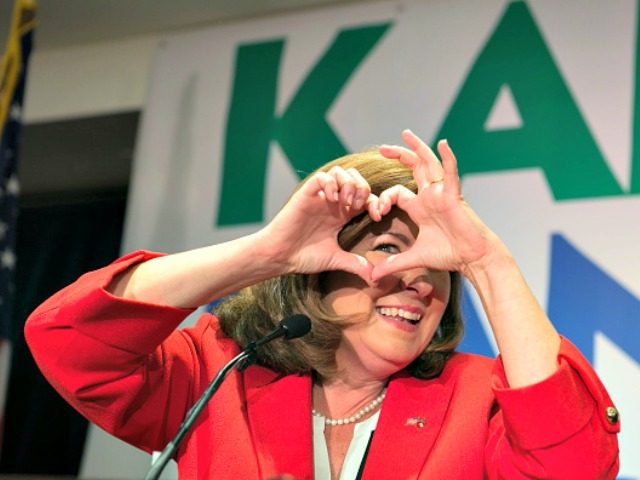Republican Karen Handel has won the special election in Georgia’s Sixth Congressional District, according to Decision Desk HQ, which called the race for her at 9:59 pm eastern.
Karen Handel has won #GA06 pic.twitter.com/JOL1Pd3dLx
— Decision Desk HQ (@DecisionDeskHQ) June 21, 2017
With 79 percent of the precincts reporting at 9:59 pm eastern, Handel held the lead with 52.4 percent of the vote, compared to 47.6 percent of the vote for Democrat Jon Ossoff, according to the Real Clear Politics vote count.
In raw votes, Handel had 114,790 votes, compared to Ossoff’s 104,316 votes, an advantage of more than 10,000 votes.
It was a stunning setback for Democrats nationally, who had poured more than $30 million into the Ossoff candidacy, either through direct funding of his campaign, party expenditures, or independent organization expenditures.
The race to replace Rep. Tom Price (R-GA), now Secretary of Health and Human Services, had originally been considered a “bellwether” test of President Trump’s policies. Instead it quickly became the most expensive Congressional election in American history, a “one-of-a-kind” event, the outcome of which gives the victorious party temporary bragging rights, but perhaps little more.
More than $50 million was spent on the race, with Ossoff enjoying a decided financial advantage over Handel.
The Ossoff campaign raised $23 million as of May 31, according to Federal Election Commission records. The Handel campaign, in contrast, raised only $4.5 million over the same period time.
The vast majority of Ossoff’s contributions came from out-of-state, primarily liberal strongholds in California, New York, and Massachusetts.
Based on estimates included in an analysis published in the Atlanta Journal Constitution on Tuesday, Ossoff outspent Handel in television and radio ad spending by a 6 to 1 margin, $22.5 million to $3.5 million:
An election-eve analysis by The Atlanta Journal-Constitution shows that roughly $42 million has been spent or reserved for TV and radio ads in the race – including about $27 million since the first-round of voting in April winnowed the field in Tuesday’s vote to Democrat Jon Ossoff and Republican Karen Handel.
That doesn’t include the other cash spent by the campaigns and the super PACs and outside groups supporting them for other trappings of the campaigns, including direct-mail, staff payroll, consulting fees and digital ads.
The analysis shows Ossoff laid out $14.2 million on ad time and spent at least another $8 million on other costs. Handel spent $2.5 million on TV, radio and cable spots and had at least $1 million in other expenses.
Both sides, however, benefited from hefty party spending as well as significant spending by independent expenditure groups.
Adding those outside expenditures into the total, Ossoff and his supporters outspent Handel and her supporters by more than $10 million. Ossoff and his outside supporters spent over $30 million on the campaign, while Handel and her outside supporters spent under $20 million.
“[T]he Democratic Congressional Campaign Committee spent nearly $5 million on TV ads boosting his campaign or slamming Handel, while other left-leaning groups chipped in about $1 million more,” the Journal-Constitution added:
In all, left-leaning groups and Ossoff combined for about $2 million more in ad spending than Handel and conservative allies during the runoff phase.
On the GOP side, two groups accounted for the lion’s share of spending.
The National Republican Congressional Committee shelled out more than $6.7 million on ads in the race. And the Congressional Leadership Fund – a super PAC with ties to Speaker Paul Ryan – spent about $5 million on airtime. The group said it spent another $2 million on other costs, including a field operation aiming to target 300,000 voters by Tuesday.
Two other conservative groups – America First Policies and the U.S. Chamber of Commerce – each chipped in at least $1 million more.
“The tally is still emerging – and one estimate by a nonpartisan advocacy group Issue One has the total cost at roughly $60 million,” the Journal-Constitution concluded.
Polls coming into election day showed the race to be a tossup, with Handel gaining slightly on Ossoff, who had enjoyed as much as a seven point lead two weeks prior to the election.
Elements of Ossoff’s life story that did not ring true with voters may have cost him some of the key but small swing voters.
On Monday, for instance, a reporter for The Washington Free Beacon demonstrated that Ossoff lived three miles outside the district, rather than three blocks, as his campaign workers had said.
The aftermath of the shooting of Rep. Steve Scalise (R-LA) by a Bernie Sanders supporter at the Republican Congressional baseball team’s practice in Alexandria, Virginia on Wednesday may also have played a role in the final outcome.

COMMENTS
Please let us know if you're having issues with commenting.